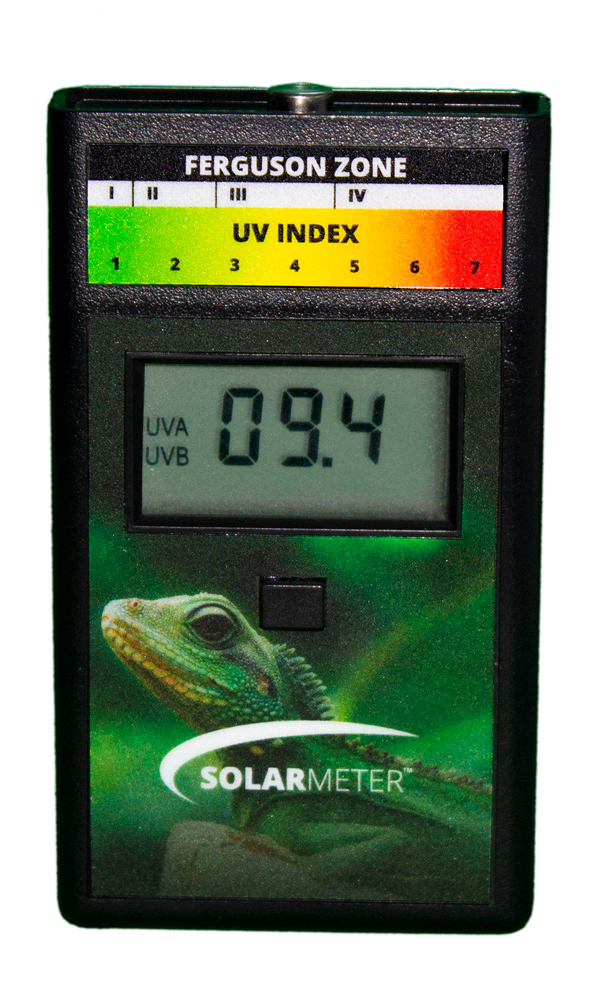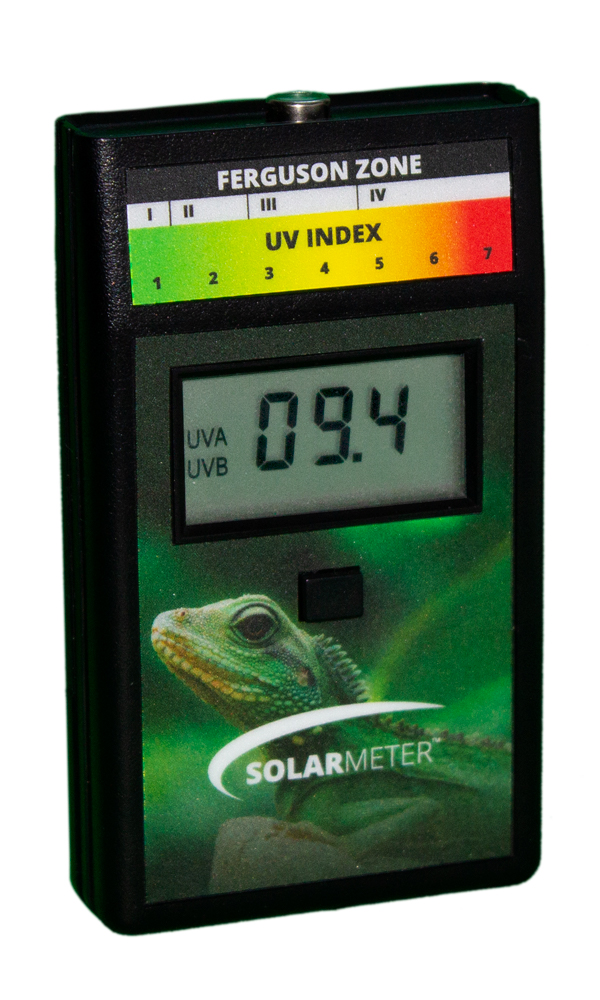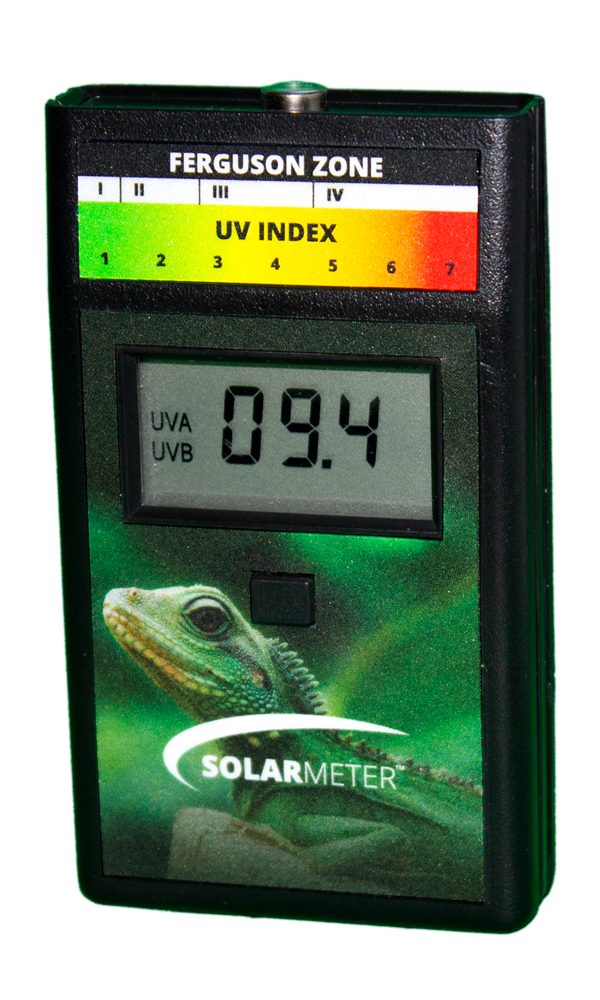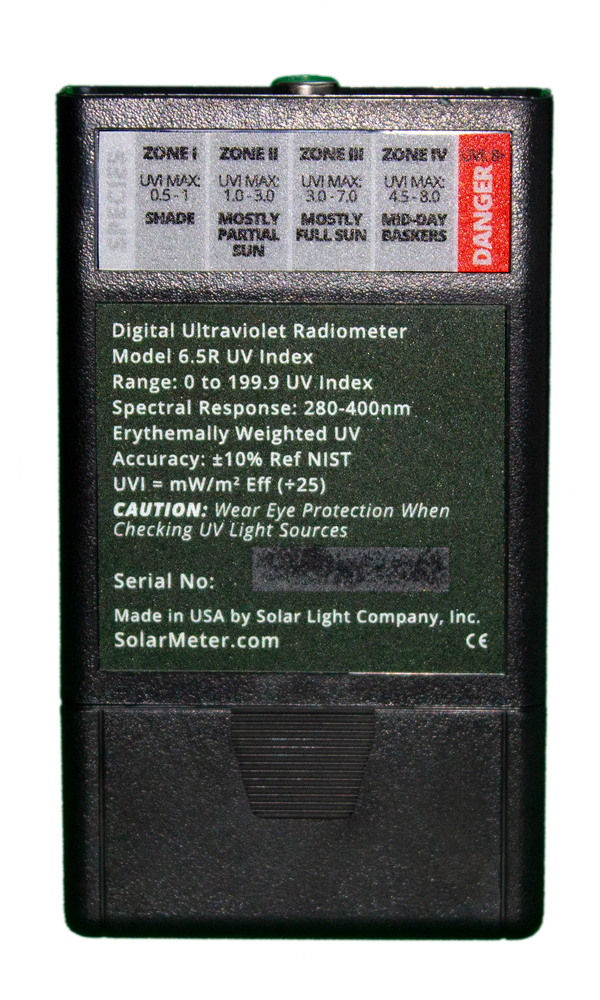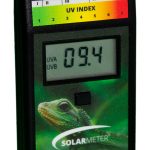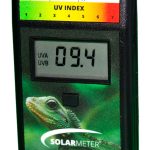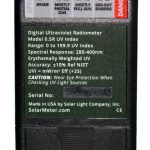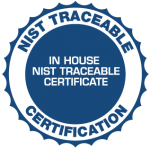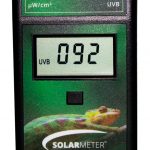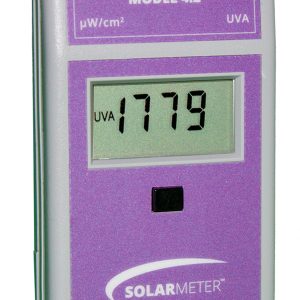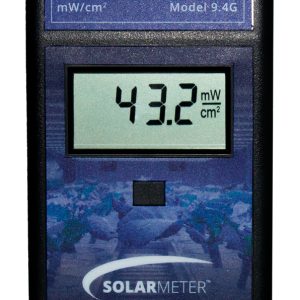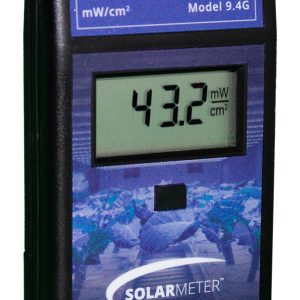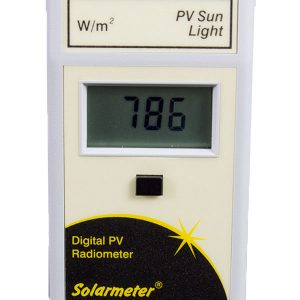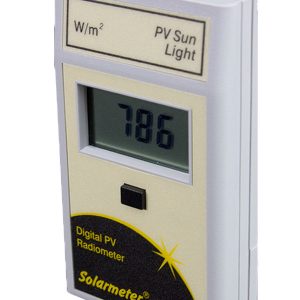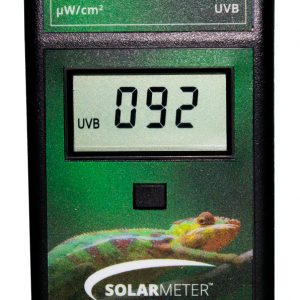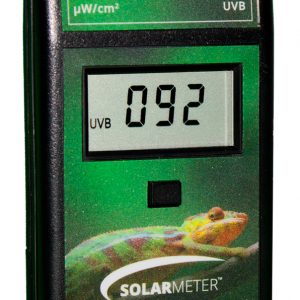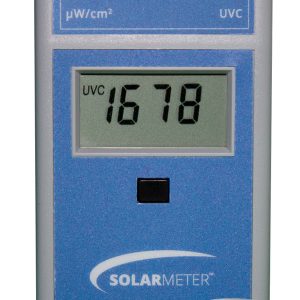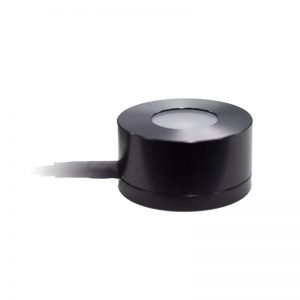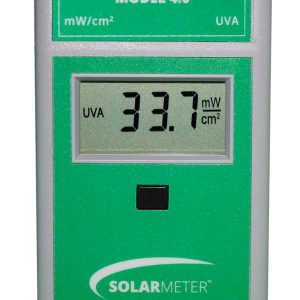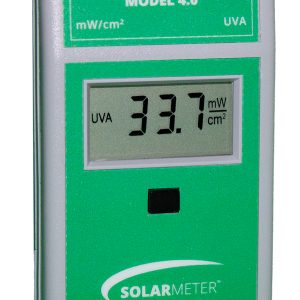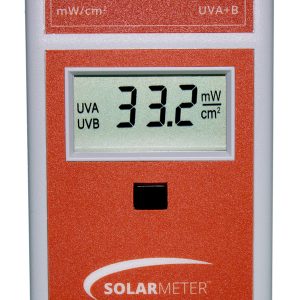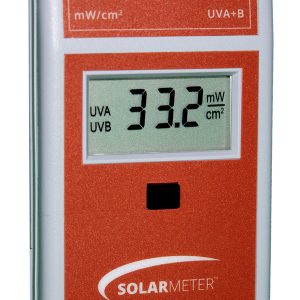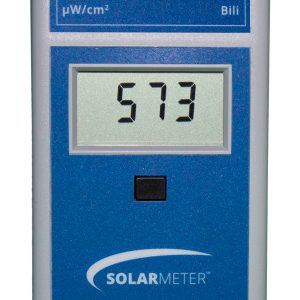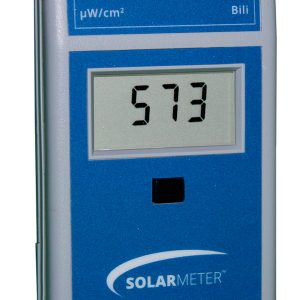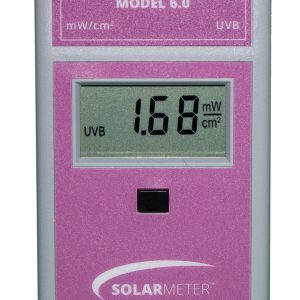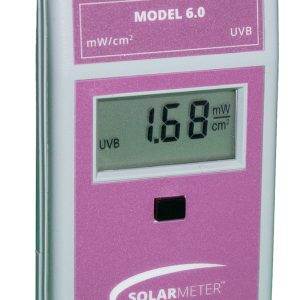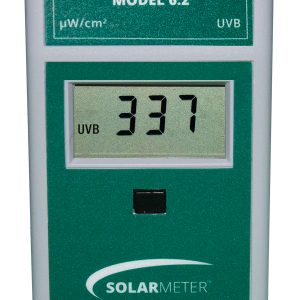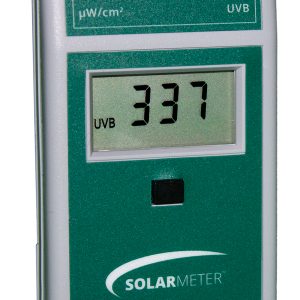Solarmeter® Model 6.5R Reptile UV Index Meter
$249.00
Features:
- Spectral Response Erythemally Weighted to Match Vitamin-D Action Spectrum in Reptiles
- Ferguson Zone Chart On Meter Front Panel For Easy Reference
- Compact, Handheld, and Durable
- Simple Single-Button Operation
- NIST Traceable Accuracy
- LCD Display
- Made In USA
Applications:
- Measures UV Irradiance In The Wavelengths That Enable Vitamin D3 Synthesis in Reptiles
- Monitors Instantaneous UV Index
- Allows UV Index Tracking Over Time
- Description
- Additional information
- Videos
- Downloads
Description
Solarmeter’s new Model 6.5R Reptile UV Index Meter updates our legendary original Model 6.5 UV Index Meter with attractive, informative graphics specifically designed for reptile husbandry. Many scientists and breeders worldwide rely on the original Model 6.5 UV Index Meter, so the new Model 6.5R is unchanged operationally or in terms of specifications from the original. We just made this meter easier for reptile owners to use by updating the graphics with the latest scientific research about proper UV dosages for reptiles. Specifically, the Ferguson Zone chart at the top of the meter provides the user with an instant, accurate reference for the meter’s UVI readout.
Meter Operation
To operate your Solarmeter, aim the sensor window located on the top panel of the meter directly at a UV source. Press and hold the push-button switch on the face of the meter. For best results take note of the distance the reading was taken from the UV source in order to ensure repeatable results. Battery operation voltage is viable from 9V down to 6.5V. Below 6.5V, the numbers on the LCD display will begin to dim, indicating the need for battery replacement. Under typical service load, a standard 9V battery will last approximately 2 years.
Proper Usage of Solarmeter® Ultraviolet Radiometer
Wear eye protection when checking UV lamps (Glasses that provide wrap around protection are ideal). Allow lamps to warm up prior to taking readings (at least 15 minutes).
SOLARMETER MODEL 6.5R UVI READOUT
| Ferguson Zone | Species Include: | Suggested UVB |
|---|---|---|
| Zone 1: Crepuscular or Shade Dweller, Thermal Conformer |
Crested Gecko Leopard Gecko Tokay Gecko Burmese Python Green Tree Python Milk Snake Reticulated Python |
Shade Method: Gradient UVI 0-0.7 |
| Intermediate between Zones 1 and 2 | Fiji Branded Iguana Corn Snake Carpet Python |
Shade Method: Gradient UVI 0-0.7 |
| Zone 2: Partial Sun / Occasional Basker, Thermoregulator |
Australian Water Dragon Emerald Tree Monitor Green Anole Monkey-Tailed Skink Pygmy Chameleon Ornate Box Turtle Red Foot Tortoise Boa Constrictor Red-Tailed Ratsnake Garter Snake Western Hognose Snake |
Shade Method: Gradient UVI 0-1.0orSunbeam Method: UVI Maximum 1.1-3.0 in Basking Zone |
| Intermediate between Zones 2 and 3 | Blue-Tongued Skink Chinese Water Dragon Panther Chameleon Common Musk Turtle |
Sunbeam Method: UVI Maximum 1.1-3.0 in Basking Zone |
| Zone 3: Open or Partial Sun Basker, Thermoregulator |
Black-and-White Tegu Frilled Lizard Standing’s Day Gecko Yemen Chameleon Indian Star Tortoise Leopard Tortoise Spotted Turtle Diamond Python |
Sunbeam Method: UVI Maximum 2.9-7.4 in Basking Zone |
| Intermediate between Zones 3 and 4 | Bearded Dragon Bosc or Savannah Monitor Green Iguana Painted Turtle Red Eared Slider Sulcata or African Spurred Tortoise |
Sunbeam Method: UVI Maximum 2.9-7.4 in Basking Zone |
| Zone 4: Mid-Day Sun Basker, Thermoregulator |
Chuckwalla Uromastyx Rhinoceros Iguana Texas Horned Lizard |
Sunbeam Method: UVI Maximum 4.5-8.0 in Basking Zone |
| The above chart is an abbreviated version from the January 2016 Journal of Zoo and Aquarium Research, “How much UV-B does my reptile need? The UV-Tool, a guide to the selection of UV lighting for reptiles and amphibians in captivity” by Dr. Frances Baines , Joe Chattell, James Dale, Dan Garrick, Iri Gill, Matt Goetz, Tim Skelton, and Matt Swatman. | ||
Note: Data is shown in two basic sets of values with two ways of providing UV: “Shade Method” for Zones 1 and 2, the shade-dwelling species. (These are given low-level UVB across a wide area of the vivarium with a gradient to zero in deep shade, as they don’t generally bask in bright hot patches of sunlight). “Sunbeam Method” is for Zones 3 and 4, which are species that bask in sunlight. (These are given higher UVB, but limited to the basking zone in a much smaller part of the vivarium, like “a patch of sunlight” under a lamp. Vivarium should still have a gradient to zero in deep shade).
| Model 6.5R Reptile UV Index Meter | |
| Model | 6.5R |
| Irradiation Range | 0-199.9 UV Index |
| Response | 280-400 nm Diffey Erythemal Action Spectrum (closesly matches Vitamin-D Action Spectrum) |
| Resolution | 0.1 UV Index |
| Conversion Rate | 3.0 Readings/Sec |
| Display | 3.5 Digit LCD |
| Digit Size | 0.4 (in) / 10.2 (mm) high |
| Operational Temperature | 32°F to 90°F / 0°C to 32.2°C |
| Operational Humidity | 5% to 80% RH |
| Accuracy | ±10% REF.NIST |
| Dimensions |
4.2L x 2.4W x 0.9D (in) / 106.7L x 61W x 22.9D (mm) |
| Weight | 4.5 (oz) / 128 (g) Including Battery |
| Power Source | 9-Volt DC Battery |
| Lens | UV Glass |
| Diffuser | Teflon |
| Agency Approval | CE Mark |
Spectral Response Graphics
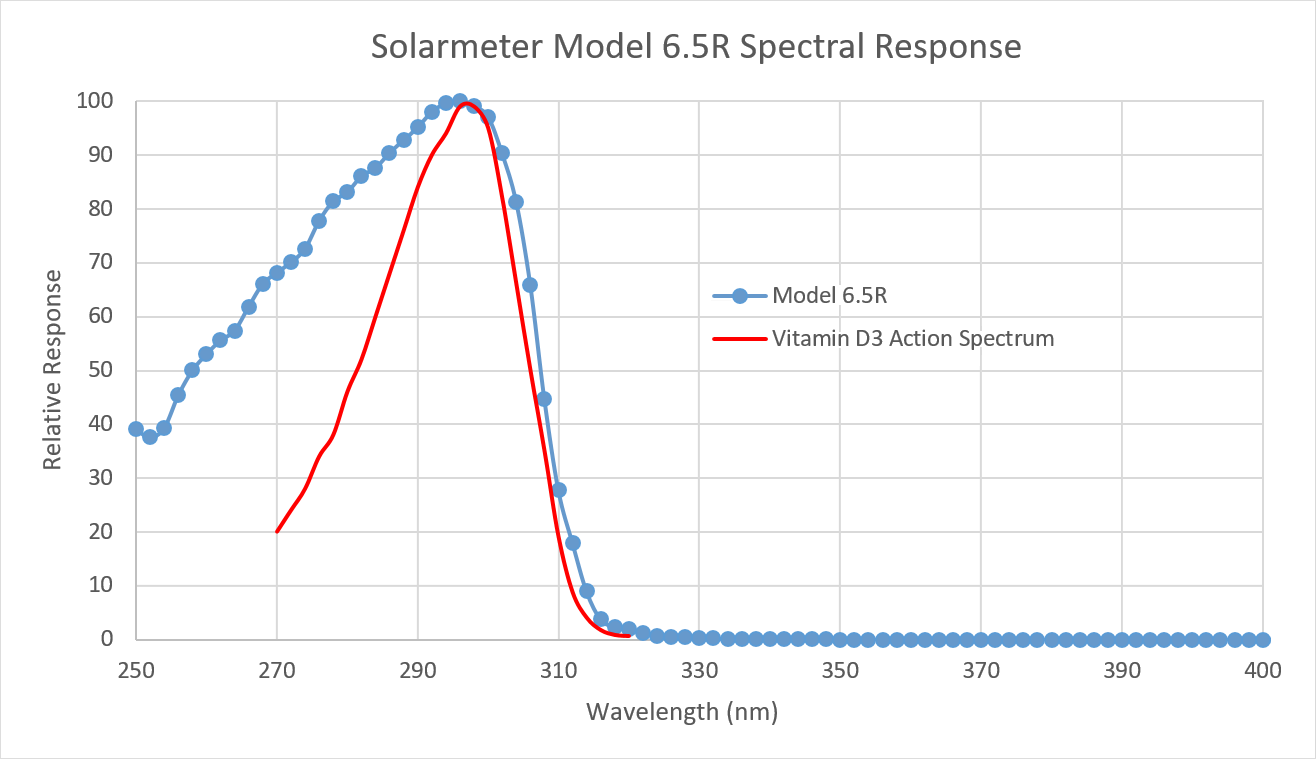
FAQS
What is a Ferguson Zone?
Using the original Solarmeter® Model 6.5 UV Index Meter, a team of herpetologists led by Professor Gary Ferguson of Texas Christian University published research in 2010, which summarized the daily UV exposure of 15 species of reptiles that were studied in the wild. These species were grouped into four zones, aka “Ferguson Zones,” according to their daily sun exposure requirements. In 2012, the British and Irish Association of Zoos and Aquariums (BIAZA) built on Ferguson’s research to produce a document allocating Ferguson Zones to 254 species of reptiles and amphibians. You can download this report here. Today, ongoing research continues to apply Ferguson Zones to even more species.
Which Meter Do I Need For My Reptile – Model 6.5R Reptile UV Index Meter or the Model 6.2R Reptile UVB Lamp Meter?
Ideally, reptile keepers will want both meters. Because the Model 6.5R Reptile UV Index Meter’s erythemally weighted action spectrum is extremely close to the action spectrum for vitamin D3 synthesis, it is the ideal tool to determine proper UV dose for your reptile, per the appropriate Ferguson Zone for the species. In fact, the 6.5R’s readings can function as a proxy for the vitamin D3-producing ability of the habitat’s light source. Meanwhile, the Model 6.2R Reptile UVB Lamp Meter is ideally suited to determine if UVB lamps are performing to manufacturer’s specifications, gauge intensity, and measure aging over time. So, in short, use the Model 6.5R to determine proper UV dose for the animal, and use the Model 6.2R to determine UVB lamp output.
References
Reptile Lighting Information by Dr. Frances M. Baines – Reptiles Magazine 2009
Additional information
| Weight | 0.5 lbs |
|---|---|
| Dimensions | 7 × 3.5 × 2.5 in |
| Sort order |

